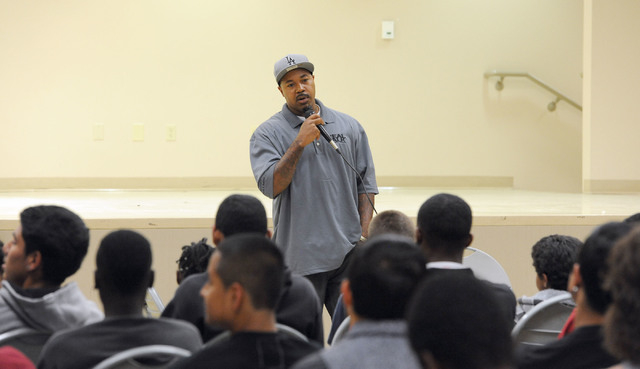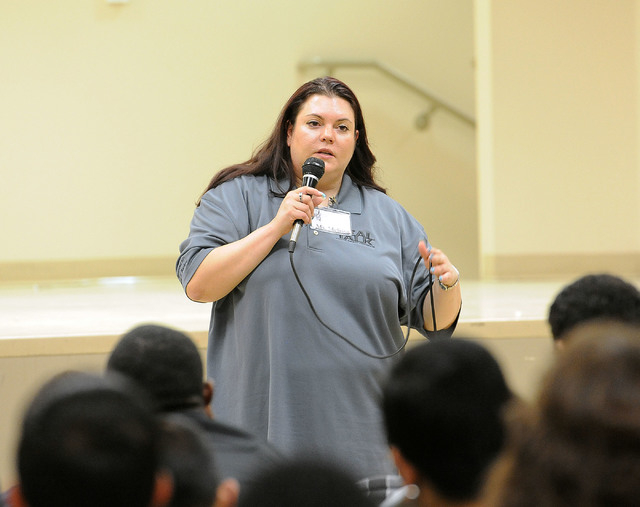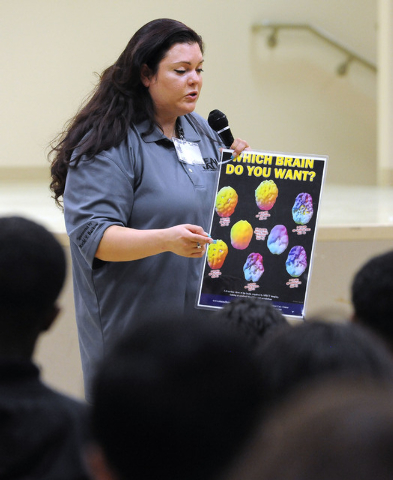Former offenders tell youths what it’s like to be behind bars




About 30 youths sat in rapt attention as Robert Williams, a former federal convict, spoke April 1 at the Dr. William U. Pearson Community Center, 1625 W. Carey Ave. He detailed the mistakes he made that led him to prison and let attendees know what they could expect in prison if they followed that same path.
“Prison is not a cool place,” Williams said. “You may have friends or relatives who are in prison or got out of prison tell you different, tell you that they met so and so and had a good time doing this and that, but that’s just a front. Prison is rapes, stabbing and jumping. Y’all want to go through that?”
Most of the the audience was made up of teens who had been in trouble with the law, their schools or their parents, but Sheree D. Corniel, executive director of the Real Talk Youth Impact Program, hopes to get other youths to attend the monthly events in which speakers who have served time for crimes share their stories.
“We want kids from the community to come, even if they’re not in the (penal) system,” Corniel said. “We’re trying to prevent them from getting into the system.”
Williams asked attendees for a show of hands of which of them knew someone who had used drugs (most of them) and who had been stabbed (one child.)
“You’ve been stabbed? It hurts, right?” Williams asked the child and then addressed the whole room. “Stabbing hurts worse than getting shot.”
Corniel began working on the program in 2012 when she was a probation officer, a job from which she recently had to retire due to an injury. She still relies on the connections and contacts she made in that job and has begun reaching out to the community for more contacts. She put together the first Youth Impact event in June 2013.
“We have partners who set up tables in the back where the kids can get information on services and activities,” she said. “As part of the program, as long as you remain in school, maintain a 2.0 grade and you’re in compliance with the court orders or parental regulations, we’ll pay for your extracurricular, like chess, basketball, tennis, music lessons, tae kwon do or whatever.”
She said part of the program is set up like a career day but is actually an activity day.
“The idea is to get them involved in something positive and steer them away from anything that’s negative,” Corniel said. “We want them to come back every 30 days to hear from three other members, who are very diverse.”
In addition to Williams, who was involved with violent crime and drugs, the audience heard from a woman who lost her job as a forensics expert when she became involved in illegally obtained prescription drugs while she was fighting what she thought was a losing battle with cancer.
Corniel wants youths to attend three of the monthly events to help set them on the straight and narrow. Attendees receive a certificate from the program and from city officials and those in Nevada’s congressional delegation.
One recent graduate is 15-year-old Stephanie Adams, who took part in the program after she ended up in juvenile detention for curfew violations and trespassing.
“I used to be bad, but the stories they told us about prison opened my mind up all of a sudden,” she said. “When my parents saw me in juvie, they cried.”
All of the charges stemmed from Adams being caught on the Strip after curfew, she said.
“Every day is a new thing,” said Adams, who hopes to join the FBI. “I want to be active and wake up to something new and exciting.”
For more information on the Real Talk Youth Impact Program, visit realtalk.com or call 702-625-2417.
Contact East Valley View reporter F. Andrew Taylor at ataylor@viewnews.com or 702-380-4532.












